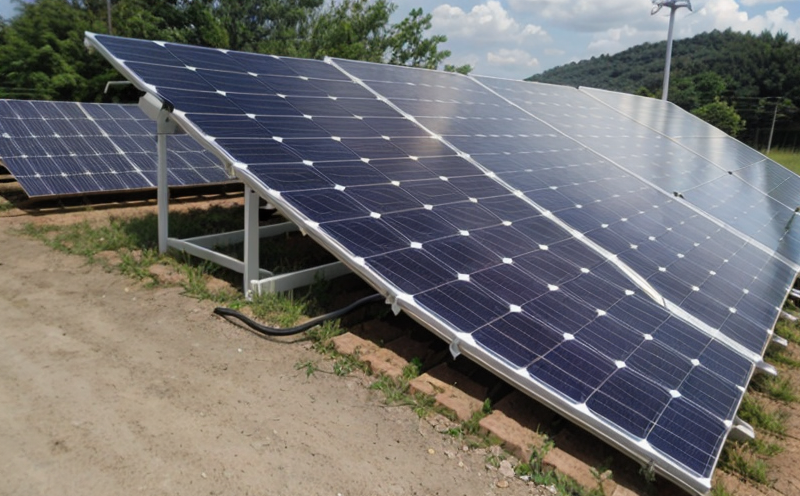IEC 60068-2-68 Dust and Sand Resistance Testing
The IEC 60068-2-68 standard is a critical part of ensuring the durability and reliability of photovoltaic (PV) modules in harsh environmental conditions. This test evaluates the ability of solar panels to withstand exposure to dust and sand, which are significant factors contributing to module degradation over time. The test simulates real-world conditions where PV systems are exposed to airborne particles that can accumulate on the surface of the module, reducing its efficiency.
The standard specifies a series of tests designed to assess how well solar panels perform under varying levels of dust and sand exposure. This includes both static and dynamic tests, which help determine the long-term effects of environmental contamination on the performance of PV modules. The static test measures the power output before and after the accumulation of particles, while the dynamic test evaluates the module's ability to clear accumulated dust.
For solar panels operating in arid regions or areas prone to sandstorms, this testing is essential for ensuring long-term reliability and performance. The standard also provides guidance on specimen preparation, which includes cleaning and conditioning the module prior to testing. This ensures that any pre-existing dirt or contaminants do not affect the test results.
The IEC 60068-2-68 dust and sand resistance test is carried out in a controlled environment where conditions closely mimic real-world exposure. The test chamber simulates wind-driven sand and dust, with particles of various sizes and densities being blown against the module's surface at specified velocities and for defined durations. This helps to replicate the wear and tear that solar panels experience over their operational life.
Testing according to IEC 60068-2-68 ensures compliance with international standards, which is crucial for manufacturers seeking to sell products in multiple global markets. Compliance also enhances the reputation of a company by demonstrating its commitment to quality and reliability. The test results provide valuable insights into the durability and performance of PV modules under challenging environmental conditions.
Understanding the real-world implications of dust and sand exposure can significantly impact the design and maintenance strategies for solar energy systems. By incorporating this testing into the development and certification process, manufacturers can ensure that their products meet or exceed performance expectations in even the most demanding environments.
Applied Standards
| Standard | Description |
|---|---|
| IEC 60068-2-68 | Dust and Sand Resistance Test for Electrical and Electronic Equipment |
| ISO 9859:1997 | Environmental Testing - Part 3: Dust Tests on Components, Subassemblies and Enclosures |
| ASTM G24-06(2016) | Ambient Environmental Conditions for Exposure Testing of Solar Photovoltaic Systems |
| IEC 61730-1 | Photovoltaic Modules - Part 1: Requirements and Test Procedures |
Scope and Methodology
The scope of the IEC 60068-2-68 dust and sand resistance test is to evaluate the performance of solar panels under conditions that simulate real-world exposure to airborne particles. The test covers both static and dynamic testing phases, providing a comprehensive assessment of the module's ability to withstand environmental contamination.
In the static phase, the specimen is exposed to dust and sand for a specified duration, typically 24 hours. During this time, the module is placed in a controlled environment where particles are gradually deposited on its surface. After exposure, the power output of the module is measured using a solar simulator or other appropriate measurement equipment.
The dynamic phase involves simulating the cleaning process that occurs naturally due to wind or rain. This part of the test evaluates how well the module can clear accumulated dust and sand, restoring its original performance levels. The cleaning process is simulated by applying a controlled airflow or water spray to remove particles from the surface of the module.
The acceptance criteria for this test are based on the percentage change in power output before and after exposure to dust and sand. A smaller percentage change indicates better resistance to environmental contamination, suggesting higher reliability and durability of the solar panel under real-world conditions.
The methodology also includes detailed instructions for specimen preparation, including cleaning procedures and conditioning steps. These steps ensure that any pre-existing dirt or contaminants do not affect the test results, providing a more accurate assessment of the module's performance in contaminated environments.
Eurolab Advantages
At Eurolab, we offer comprehensive testing services tailored to meet the highest international standards. Our expertise and facilities ensure that our clients receive reliable and accurate test results for their solar panels. Here are some of the key advantages of working with us:
- State-of-the-Art Facilities: Equipped with advanced technology and equipment, Eurolab can simulate a wide range of environmental conditions to accurately assess the performance of PV modules.
- Comprehensive Testing Services: Our services encompass all aspects of solar panel testing, including IEC 60068-2-68 dust and sand resistance tests, ensuring comprehensive compliance with international standards.
- Experienced Professionals: Our team of experts has extensive experience in the field of photovoltaic testing, providing valuable insights and recommendations for improving product performance.
- Fast Turnaround Times: We understand the importance of timely results and strive to deliver accurate test reports within agreed-upon deadlines.
- Cost-Effective Solutions: Eurolab offers competitive pricing without compromising on quality, ensuring that our clients receive excellent value for their testing needs.
- Dedicated Support: Our customer service team is always available to provide guidance and support throughout the testing process, ensuring a smooth and efficient experience.
With Eurolab, you can be confident in the quality and reliability of your solar panel products. Let us help you ensure that your PV modules are ready for the toughest environmental conditions.





